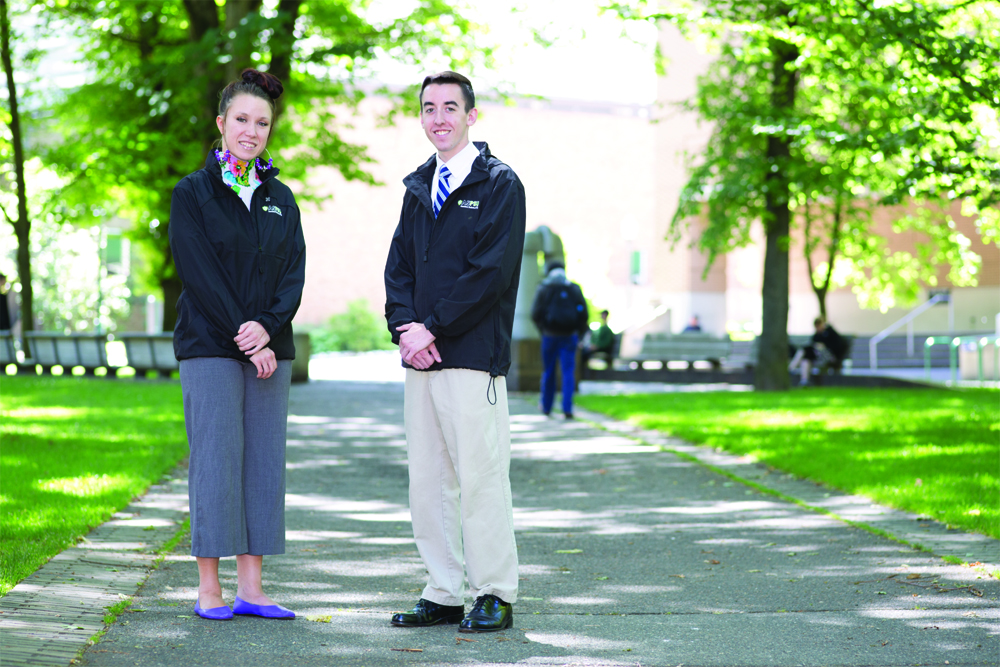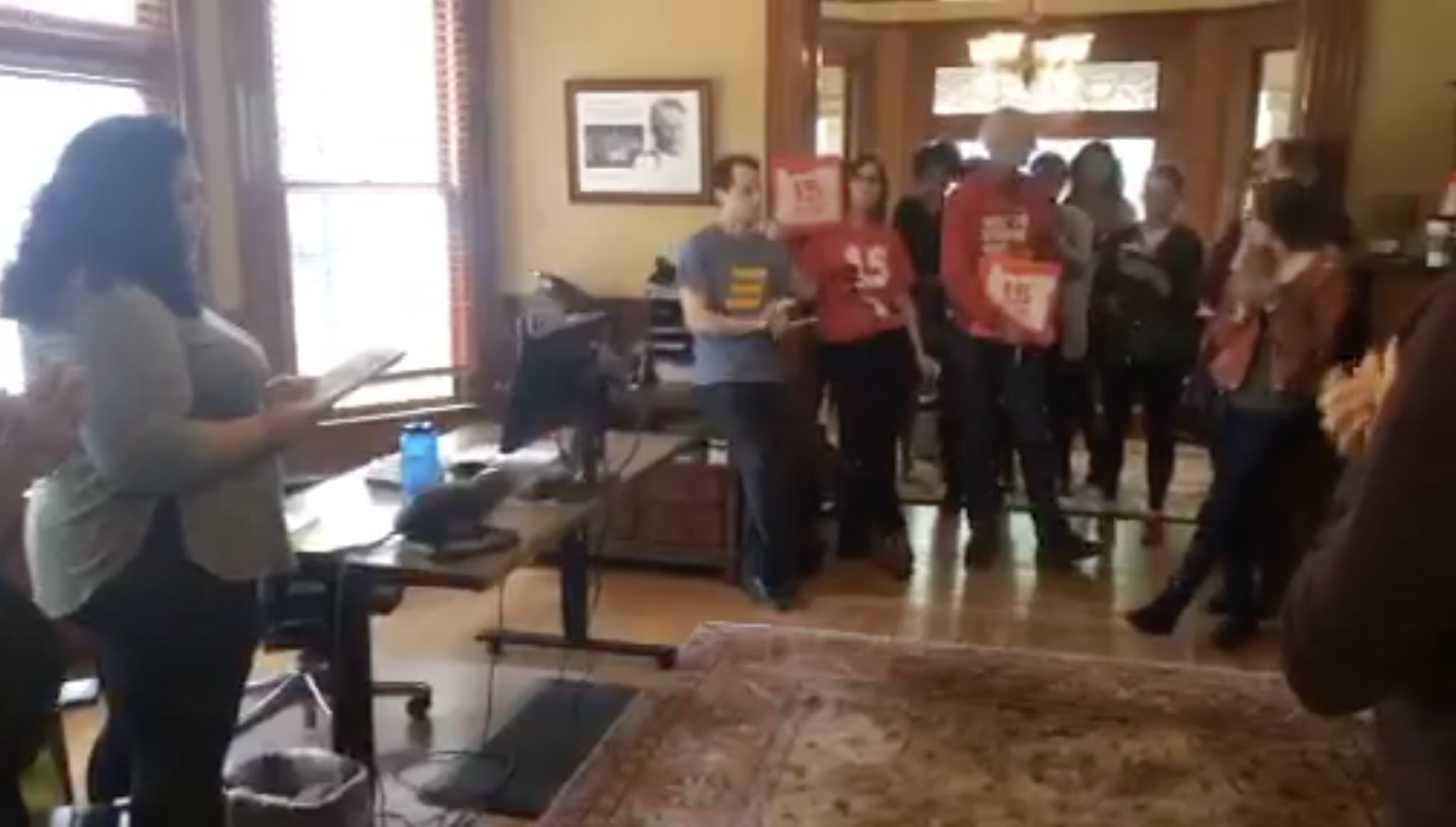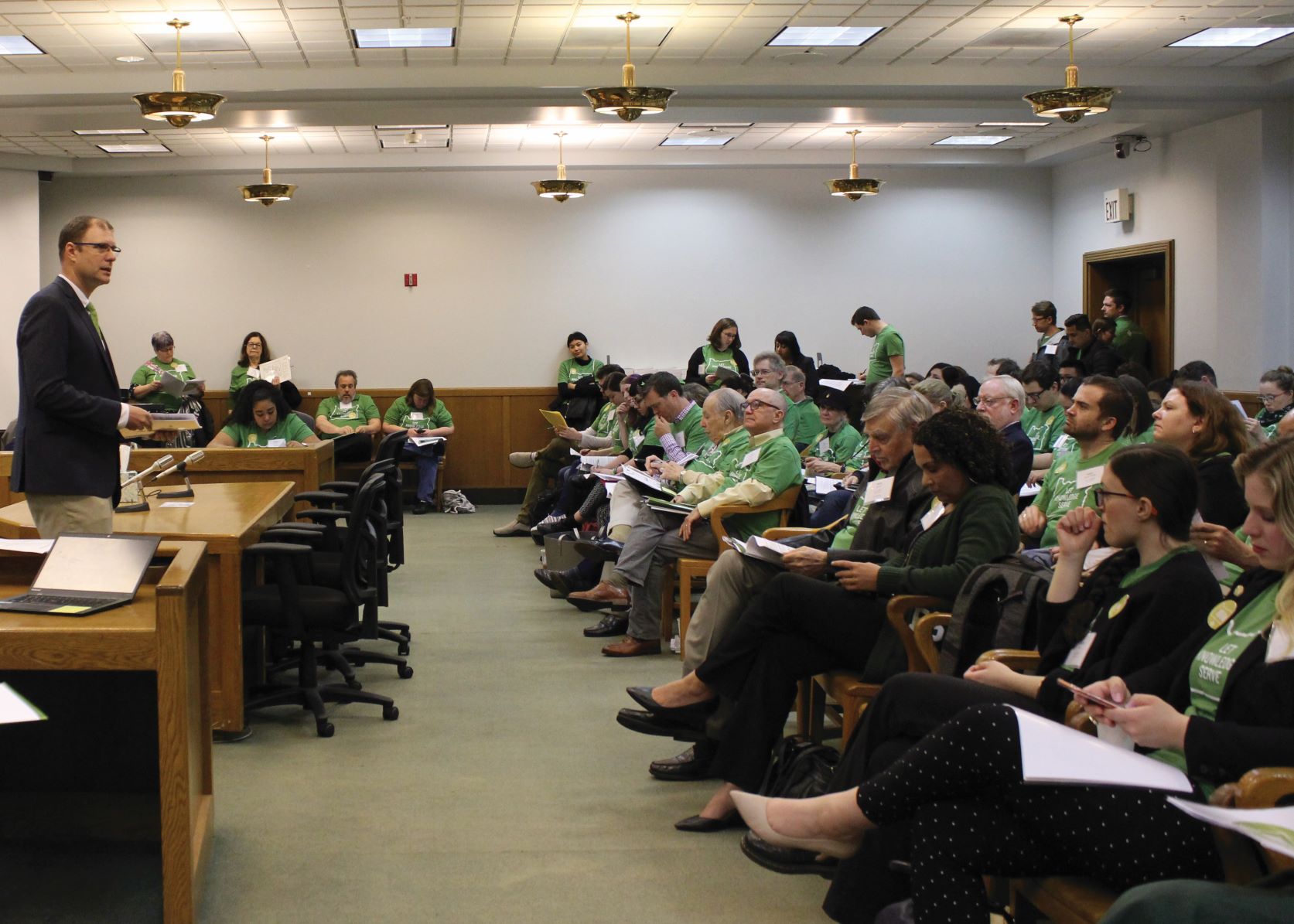After an unprecedented double election this spring term, Dana Ghazi and Davíd Martinez of the Student Power Coalition slate have just begun their 2015–16 term as president and vice president of the Associated Students of Portland State University.
Outgoing ASPSU President Eric Noll and Vice President Rayleen McMillan sat down with the Vanguard to reflect on the past year as student leaders.
Noll and McMillan discussed two messy elections, rocky working relationships, compromises, sleepless nights, unexpected challenges and victories, unsung groundwork, and why they’ll never run for elected office again.
Controversial elections
Last year, Noll and McMillan ran for ASPSU office under the campaign slogan, “Take Back PSU!” They received the second highest number of student votes—201 less votes than their opponents Marcus Sis and Erica Fuller. Sis and Fuller were ultimately disqualified after a controversial decision by the group of people who served, at the time, as both the ASPSU Elections Committee and Judicial Review Board.
Noll and McMillan took office without the other members of their slate elected alongside them, which led to a difficult transition at the beginning of the year. They struggled to find common ground and collaborate with members of the Senate and Student Fee Committee, who were less than thrilled to serve under the leadership of their competition.
Take Back PSU! Platform
Noll and McMillan ran for office with a strategic plan that outlined three pillars, which were then broken down into more specific tasks to make a nine-point plan. The three main objectives were Authentic Involvement in Campus Governance; Visible Progress Toward a Safer Campus; and Meaningful Access to Quality Education.
Authentic involvement in campus governance
Under the Authentic Involvement in Campus Governance pillar, they discussed several accomplishments: building relationships with administrators and university decision-makers, shaping the Tuition & Fees Policy under the new Board of Trustees, the appointment of two student trustees to the BOT, and surviving a tumultuous start to their term.
Eric Noll: I would call it a victory… even being able to get off the ground at the beginning of the year, given everything that happened. Walking in with a Senate and SFC that definitely weren’t from within our slate, those tensions there…
Rayleen McMillan: And then all of [those] who ended up resigning and ending up with only one remaining elected SFC member.
EN: For those who did stick around, we were able to build good working relationships that ultimately made somewhat of a functional student government—as much as student government can function.
RM: Yeah, it was refreshing to find the folks that—if I can speak candidly—it really shined through, the folks who were genuinely there to do the work, versus the folks who were there for whatever other reason.
Half of our executive cabinet were from our opposing slate. Because we saw some excellent people on that slate that we wanted to work with, so it turned into a really positive experience.
Vanguard: How long after you were elected did it take to get a cooperative feeling?
EN: I think for us to get the ball rolling in the executive cabinet, it took about a month. Coming into fall term, it took a little while to wade through some other stuff. There were a couple tough confirmations in our Senate over fall term and then the debate over the eighth SFC seat again all term—that still created some rifts for the organization.
RM: I want to be clear that Eric and I had absolutely no role in that debate. We were very intentional to stay out of that particular debate—the eighth SFC member.
EN: Which isn’t a thing that will ever happen again, unless they add it back. There are seven [SFC] members. Constitutionally all of them will be elected.
VG: Why is that such a controversial issue?
EN: I don’t think it typically is, but what the constitution did is it allowed the Senate to nominate without process. Just anybody from Senate or the gallery or if someone happened to show up in the audience to be nominated—[they] could be nominated for that seat.
Given the fallout from the election that carried in politics into that eighth seat, folks who were removed, folks who quit, a lot of the drama that happened within the SFC…that all played into the politics of that eighth seat again. As it did in June [2014] when Khalid [Alballaa] beat out Jonathen [Gates] for the seat and then when it came up in the fall with the three-way race…It carried the politics of the election with it, unfortunately.
RM: Which we witnessed as outside observers—and if I can go ahead and say—we found quite comical and were very amused by.
Visible progress toward a safer campus
Under their Visible Progress Toward a Safer Campus pillar, Noll and McMillan discussed their involvement with the Board of Trustees’ process in the authorization of a sworn police force on campus.
They also discussed successes in cultural competency policy, which they credited to former ASPSU directors Tia Gomez-Zeller and Galen Russell and their sub-committees.
Noll also discussed the work of former ASPSU Senator Melinda Joy and other ASPSU members to create a dual-approach to sexual assault on campus. He mentioned the Title IX committee and the Oregon Student Association’s work in the legislature.
EN: They made an incredible amount of progress… Noll said. [They] received an endorsement from the academic leadership team—which contains all the Deans of the college, held a cultural competency celebration, they have a draft policy, have done a lot of great work to make it part of the conversation in the strategic plan for campus and have laid groundwork for continued work of that policy next year.
The [OSA] worked on two bills that both passed this session. One was the Advocate Privilege bill that allows survivors to report anonymously to advocates on campus.
The second is a campus protocol bill that puts additional requirements in place to develop partnerships with community resources to provide preventative education, to provide plain language lists of options that students have.
VG: One of the big things that happened during your administration is the authorization of armed officers on campus.
EN: While this was something we were looking at as having to engage with throughout the year, when we were running we weren’t expecting a decision was going to be made this year. We didn’t expect it to be nearly as intense as it was.
While there was a process, it was fast. I think we had our first briefing…in August, and then came into the BOT meeting in September. The BOT was ready to just go right there without a plan or anything. And we were shaking our heads vigorously in the audience, and [PSU President Wim Wiewel] said, “Slow down, let’s do a process over fall term and come back in December and look at it.”
We gave it everything we had and that was the thing we spent the majority of our time on over fall term was being involved with that policy attending forums and meetings, talking with Kevin Reynolds, David Reese and Chief [Philip] Zerzan, the litany of folks who were involved in trying to find a way to walk the line in between the support and opposition, based on the survey results we were operating off of from 2013.
RM: Two different sets of survey results.
EN: And trying to maintain access to all of those groups so that we can make as informed a decision as possible.
It was important for us to hear from both proponents and opponents of the policy—so that whatever recommendations we made, if we did make them, related to the language of the policy or the resolution so that it could be well-educated.
Being our fourth and third year in student government that year, we’ve grown to understand campus politics a bit.
RM: We know when something has inevitability and when something doesn’t.
EN: We saw that even in our August meeting, and from there we really angled our strategy more about how do we affect the language and not how do we stop this…It was going to happen at some point, based on what we saw from our experience. We angled to make it as least abrasive as possible.
RM: Eric and I faced substantial criticism from the opposition, we actually got a small amount from folks who support it—which exists in much greater numbers on this campus than people may realize…For every student that approached me personally and was like, “I’m scared, this makes me unsafe, the idea of sworn officers is not okay with me.”…There was at least one more student that would say, “This is going to make me feel safer on campus.”
It was really hard work for us to put our own personal opinions aside on this. Because, quite frankly, we were both personally very uncomfortable with the idea of a sworn police force, but we very intentionally set those personal feelings aside and did our best to represent a very divided constituency.
VG: Why do you think the BOT was so eager to come in and approve it in September?
EN: They were presented with a problem, presented with a solution. They said, “We want to fix it.” And then over the proceeding months heading up to December, we met with many of them and had very good conversations.
We also have to recognize this board came into power July 1 of that year. They were all very new—many of whom, through no fault of their own, had never operated in the public sector before.
So we’ve seen…many trustees learning how to operate in the public sector and the university world—many of whom are very eager, from what we’ve seen, are very eager to seek and receive input—respectful and level-headed input.
RM: I feel like some folks interpreted our movement through that issue as indifference, which could not have been further from the truth. We both lost a significant amount of sleep over it. We put hundreds of hours into it.
And the result might not be the one that everybody wants, but we would have had a much harsher result much earlier on, had it not been for our engagement and for engagement of other activated students.
Meaningful access to quality education
Under the final pillar, Meaningful Access to Quality Education, Noll and McMillan ran with three tenets: reconnecting ASPSU with the student community, focusing on student spaces on campus, and working very heavily in the legislative session.
EN: Starting with reconnecting ASPSU with PSU students: I would say that always tries to answer the million-dollar question of how to engage students on campus. We did very poorly this year…in terms of an overall connection and increasing the engagement of the student body on campus, I don’t think we did very well at it.
RM: I don’t think student governments ever do very well at it, though…I don’t think we did any worse than our colleagues at peer institutions and I don’t think we did any worse than past ASPSU administrations have done.
My hat is off to the student government who cracks the code on how to get even thirty percent of the student body actively engaged in ongoing things.
EN: One thing we were successful with this year, is we as a student government were able to develop a really good relationship with the new athletic director and the athletics department.
RM: I think the cultural competency campaign really engaged students on an excellent level as well.
VG: Is there anything that you wish would have happened during the last year that you could have put more energy into?
EN: One of the things I would have liked to have done much better, given more time and given different circumstances, was [to] have better relationships and a better working plan for members of the senate, senator positions specifically.
Our executive cabinet did great, the SFC did great with their advisors, but…there was a lot of turnover with the senators and I think we could have done better jobs of retaining them.
RM: Something I’m really disappointed with is that…we removed the Smith Memorial Student Union 2020 resolution from the ballot…It was painful to cast that vote.
EN: I, in 20/20 hindsight, see it as a little bit fortunate…because given the way that double election happened, that would have created an absolute mess.
I think Smith [2020] was part of a meaningful access tenet. And I will also say, going back…closing off that piece of that [plan is] what we ran on, that’s not the platform we went into the year with, though.
As we came into the year…we looked strategically at our platform the Students for a Better Tomorrow, Today’s platform, and [Community Rising’s] platform, and we held as much of that together as possible. So what we ran on was very different than what we tasked out to committees.
It was an active decision we made to compromise a little bit and to extend a few olive branches to say we are really here to do work.
VG: This most recent election is the second I’ve been through at PSU and both of them have been pretty…interesting. Why has it been so messy?
EN: There are only so many restrictions you can put on a student government elections…There are different rules than what you see in a state or federal election, but it’s just as messy.
I think the only difference is that people are much less professional about how they do the messy in the student government elections. You still see attack ads, you still see people push to get away with as much as they can and gain a competitive advantage, and it’s a fight.
If I never have to be involved with a student election again, I’ll be very happy with that, because it is not something I desire in any way.
I think it’s not a professional system and there aren’t professional expectations and definitely not professional practice in how it’s approached…Winning the election isn’t the end, but people use means to get to that as if it is the true end.
RM: I’m going to speak frankly. You referred to the last two election cycles, and I think they have been uglier than normal. There are particular…students here [who] have resorted to really ugly stuff in both elections—the same individuals who have resorted to really ugly stuff in both. Common denominators.
And what I would say to those students…who think that aspiring to student government and aspiring to power in the small sense of the word in that way, I would say this is student government, not an episode of the West Wing. Calm down.
Advice to incoming ASPSU leaders
VG: What kind of advice or hopes do you have for this administration coming in—for Dana and Davíd?
RM: Take time for deep breaths.
EN: I left a letter for Dana on her desk when she came back…I described student government as a crucible. You’re going to come out differently on the other end and it’s going to hurt at times.
But no matter how intense it gets, just remember that it’s just a collegiate student government. The decisions [and] the work that you do is extremely impactful, but if you mess up, it’s not the end of the world. So when everything’s flying at you at unbelievable speeds and when you get 60 emails a day, it’s OK.
RM: Keep everything in perspective. It can feel like the most important work in the world, and sometimes the impact that you have makes it monumentally important work, but keep it in perspective. It’s collegiate student government.
Moving on
VG: Where are you going now that your responsibilities are finished with ASPSU?
EN: I’ll start in the new public policy master’s program in the fall.
RM: It’s the first ever cohort [at PSU].
EN: It’ll be fun.
VG: And Rayleen?
RM: I’ve been working as a government relations coordinator with PCC for a couple years now. But now that I have a bachelor’s degree, they’ve really legitimized and made the position really firm and super awesome. So I’m continuing that for at least a year, perhaps two, and then I’m going to go to grad school also.
VG: Would you run for elected office again?
RM: I never have had any intention to.
EN: No.
RM: I like policy. I like shaping policy. My job at PCC is my dream job right now. I love it. I love staffing the person who is…at the podium. That’s the work I really shine in. And that’s where all the power in politics is anyway, and don’t let anyone tell you different.
VG: Can you sum up your terms as president and as vice president in two sentences?
EN: Something I’ll never forget. Something I never want to do again.
RM: I would say for me [it was] something incredibly fulfilling that I will never do again.
Additional reporting by Lisa Dunn
Editor-in-cheese






